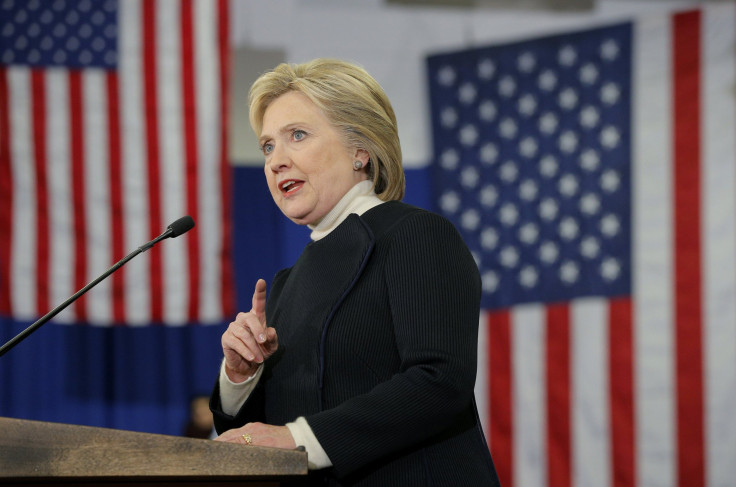Can Hillary Clinton Still Become President? Watch Concession Speech Live Stream After New Hampshire Results

Early exit poll results indicated a substantial loss for former Secretary of State Hillary Clinton in New Hampshire, as Vermont Sen. Bernie Sanders held 59 percent of the votes among the 35 percent already counted — with his margin widening as more returns came in. Clinton polled at 38 percent and Sanders was projected the clear winner of Tuesday's primary immediately after the polls closed at 8 p.m. EST.
Clinton said in a concession speech Tuesday evening that she was grateful to her supporters and vowed to win the Democratic nomination. She focused on her strength as a candidate, her commitment to combating bigotry and her intent to take on Wall Street — an issue championed by rival Sanders.
“When I tell you no bank can be too big to fail and no executive too big to jail, you can count on it,” she said.
She emphasized her commitment to fighting for justice, condemning discrimination against minority groups and women. "When people anywhere in America are held back by injustice, that demands action," she said.
Sanders, from neighboring Vermont, has held a lead in the state for months. Ahead of the vote, some pundits declared Clinton’s chance of winning the state so low that she should just skip the state — a suggestion she rejected. She vowed to “keep fighting until the last vote is counted on Tuesday." Live stream coverage of the New Hampshire primary results and candidate victory and concession speeches can be viewed on ABC News here.
ABC Breaking NewsSanders, a self-proclaimed democratic socialist, has stunned analysts and taken Clinton's campaign by surprise with record turnouts at his speaking events and his ability to raise huge numbers of small online donations. Last month, Clinton, known for her fund-raising skills, raised $15 million online, compared to Sanders, who raised a whopping $20 million.
Clinton has struggled to combat perceptions that she is overly stiff and rehearsed, while Sanders has been praised for his perceived sincerity and unpolished looks — including the occasional bad hair day.
Much of the excitement that surrounded President Barack Obama's campaign in 2008 — which championed calls for change — has gone toward Sanders in recent months. While Clinton continues to lead in national polls, the Sanders campaign has managed to gain support among young, first-time voters. Many have been swayed by Sanders' arguments against money's influence in Washington. It's a message that has hurt Clinton's campaign, which Sanders has branded as backed by big-money interests.
Sanders supporters have said Clinton cannot be trusted to scale back Wall Street's role in Washington because of the large campaign contributions she has accepted from major financial institutions. Her campaign and associated super PACs received $21.4 million from donors affiliated with banks, hedge funds and financial service firms through December, Time reported. Clinton, however, has asserted that she has a proven record of taking on Wall Street and that her plan for regulating the influence of money in politics is more aggressive than Sanders'.
Clinton received the endorsement of many high-level and respected politicians, including New Hampshire’s Gov. Maggie Hassan and the state’s Democratic Sen. Jeanne Shaheen. But many have questioned whether support from politicians has helped Clinton's campaign, given the race has been marked by anger at the establishment. Sanders has sought to portray his campaign as working in favor of average Americans.
The former secretary of state is generally expected to do well in upcoming primaries, which are set for states considerably more diverse than Iowa or New Hampshire. Clinton was found to lead Sanders by 74 points among black voters and 12 points among Hispanics, according to a Public Policy Polling national survey. Nevada and South Carolina vote later this month.
Recent national polls reveal a gap between the two candidates has been narrowing since the Iowa caucuses. Although Clinton won in Iowa, the razor-thin thin lead was read by many analysts as a win for Sanders, who performed much better than expected. Nationally, Clinton was polling at 48 percent, just a slim lead ahead of Sanders, who polled at 45 percent, according to a recent Reuters/Ipsos poll.
© Copyright IBTimes 2025. All rights reserved.






















